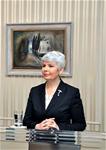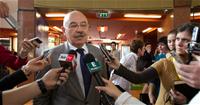Croatia – between EU membership and snap elections
Dessislava Dimitrova, March 17, 2011
 General elections in Croatia should be held after the EU accession negotiations are over, that is by the end of the year, Croatian Prime Minister Jadranka Kosor said in an interview with a local TV station on Saturday, March 12. No big news so far as, despite the pressure both from the opposition and from protesting citizens in the last few weeks, Kosor has been declining the possibility for snap elections before June, when the EU talks are expected to be officially finalised (according to the country's legislation elections in Croatia are due to by the end of the year or in the beginning of 2012)
General elections in Croatia should be held after the EU accession negotiations are over, that is by the end of the year, Croatian Prime Minister Jadranka Kosor said in an interview with a local TV station on Saturday, March 12. No big news so far as, despite the pressure both from the opposition and from protesting citizens in the last few weeks, Kosor has been declining the possibility for snap elections before June, when the EU talks are expected to be officially finalised (according to the country's legislation elections in Croatia are due to by the end of the year or in the beginning of 2012)
The completion of the talks by the end of the Hungarian presidency of the European Union has turned almost into a mantra for Kosor, who seems to be lonelier than ever on the Croatian political stage. A few weeks ago, however, EU Enlargement Commissioner Stefan Fule hinted that Zagreb had put quite an ambitious goal before itself, but Brussels was still supporting it. But last Friday a similar hint came from Hungarian Foreign Minister Janos Martonyi, who said: “we will do our utmost so that there will be further progress in the negotiations with Croatia and  our objective is still ... that we want to conclude before the end of June. Whether this is feasible or not, I have a very simple and frank answer to this question: I do not know," he told reporters ahead of the informal meeting of EU foreign ministers (of the Gymnich type).
our objective is still ... that we want to conclude before the end of June. Whether this is feasible or not, I have a very simple and frank answer to this question: I do not know," he told reporters ahead of the informal meeting of EU foreign ministers (of the Gymnich type).
In the light of growing euroskepticsm in Croatia, Kosor’s mantra on concluding EU talks in June, along with her promises to tackle corruption and the economic crisis, seems to be colliding with the mantra of some of the voters and the opposition, who say “Kosor, step down!” These words could be seen on banners carried by protesters, who gathered several times in the capital Zagreb and in other major Croatian cities. Apparently, protesters do not intend to stop their march, as there is a new protest scheduled for March 19. In an attempt to calm the political situation down, President Ivo Josipovic even took the role of a mediator between the opposition and the ruling party by inviting for talks on Friday all parties represented in Parliament. Before the meeting, some Croatian media suggested the aim of the talks was actually reaching an agreement on a possible date for snap elections.
At the end of the talks, that lasted a whole day, none of the participants could confirm this definitely, but according to Josipovic the only party that was against early elections was the ruling Croatian Democratic Union (HDZ). “The aim of today’s meeting was to find the best solution to reach one of the major goals – reforms, the end of EU membership talks and holding elections in a democratic manner,” Josipovic said at the end of the day. “Most of the parties think that the elections should be held in the autumn, only the ruling party did not share this opinion,” he added.
Kosor defended her position by saying that if early elections were called now, this would decrease the country’s chances to end the EU talks in time, as an interim government would not be able to finish the tasks that remain by the end of this process. The future of EU talks and the early elections remain an open issue at least until next week, when another round of talks between the ruling party and the opposition is scheduled.
 Bakir Izetbegovic, Andrej Plenkovic | © Council of the EU
Bakir Izetbegovic, Andrej Plenkovic | © Council of the EU Aleksandar Vucic, Recep Tayyip Erdogan | © Serbian Presidency
Aleksandar Vucic, Recep Tayyip Erdogan | © Serbian Presidency Jean-Claude Juncker, Zoran Zaev | © European Commission
Jean-Claude Juncker, Zoran Zaev | © European Commission